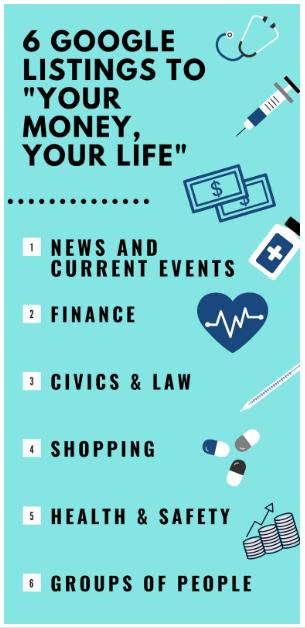A Guide to SEO: How to Navigate Google’s “Your Money or Your Life”
If you are familiar at all with SEO you know that optimisation and sharp content is the name of the game.
Quick Links
But, of course, it gets a little more complicated.
One of these “complications” is Google’s website categorization called “Your Money or Your Life”.
If you write or manage any SEO content that relates to medical information, personal finance, e-commerce, and anything related, you may be dealing with a “Your Money or Your Life” case.
In short: “Your Money or Your Life”, YMYL for short, is a lot more than just a way of organizing websites. It is also a way of managing authenticity and legitimacy in web content. If your writing or management falls under this category, then you need to be aware of the mistakes you could be making.
But, to understand exactly how YMYL might be interfering with your rankings, and to see where it might be taking SEO as a practice, let’s take a deeper look at the whole thing.
What Exactly is YMYL?
Google uses more than a couple of ways of ranking quality content. One way that Google evaluates quality content is by checking the legitimacy of certain webpages.
Legitimate content is never a bad thing. But certain types of content, usually creative content, don’t need to refer to legitimate sourcing. YMYL is a way for Google to track the legitimacy of websites which are impacting web user’s “money” or “life”. More specifically meaning, websites that could have an influence on user’s medical health, financial wealth, legal safety, or overall happiness.
YMYL can cover a lot: these sites could range anywhere from CBD Oil webshops to personal finance blogs.
Google has created stricter guidelines for evaluating and ranking pages which fall under the umbrella of YMYL. Aside from ranking pages due to their link building value and keyword traction, Google evaluates the legitimacy of the information that the content is conveying.
This means that websites which purport to give real medical advice must show legitimate sourcing and authority. For example, an article outlining the benefits of cardiorespiratory endurance must reference reputable sources and avoid superfluous claims.
YMYL has been introduced to raise the quality of the user’s web experience and to avoid deception and misinformation on the internet. If your content is honest and shows valuable research then YMYL shouldn’t negatively affect your rankings.
What to Watch Out For
You might be wondering just how seriously to take the ranking effects of YMYL. The answer is very.
Google qualifies that YMYL can apply to many different types of web pages, but gives a list of the six most common types: News and Current Events, Civics & Law, Finance, Shopping, Health and Safety, and Groups of People.

A situation that gets a lot of people in trouble is within the Health and Safety division. There is a lot of information out there on health fads, “super fast” remedies, and other sensationalized health advice. These are the types of content which promise a little too much and pose red flags for Google.
If Google catches these inconsistencies your page could be marked for low-quality and plummet in page rankings. While YMYL might make your job a little more difficult, it does introduce good practices and standards for websites.
How to Build Legitimate Content
If becoming a legitimate source is one of your goals – as it should be – then always err on the side of safety. Don’t promise too much in your content if your not completely sure of the science that’s backing it up.
Strengthening the authority of your content can boost rankings as well. Try referencing or talking to an expert on the topic of your content so that you can communicate reliable information. Only communicate the information you can. Google want’s YMYL pages to be authored by experts and not amateurs.
Great content is the foundation for successful SEO. And always remember that great content is what users will benefit from. Never promise what you don’t know or what you can’t show. If you follow this guideline you will surely avoid problems within YMYL.
How to Use SEO and SEA Together in Search Engine Marketing
In digital marketing, search engine marketing (SEM) plays a critical role in improving online…
0 Comments10 Minutes
Content Marketing Growth Hacks: Real Shortcuts to Drive Traffic
Are you still lagging in content marketing? Sticking to these old strategies seems…
0 Comments10 Minutes
How to Build a Strong Local Following Using Social Media Marketing
In the days of likes, shares, and stories, local businesses have a golden opportunity to create…
0 Comments9 Minutes
Why WooCommerce is the Best Choice for Your Online Store?
WooCommerce stands out as a top option for anyone looking to build an online store. This platform…
0 Comments8 Minutes
How to Use AI-Powered SEO Tools for WordPress eCommerce
SEO is a critical factor in the success of any e-commerce WordPress store. As competition…
0 Comments11 Minutes
Why Short-Form Videos Are the Future of Content Marketing
Your Instagram customers spend over 50% of their time watching short-form videos and reels. Rather…
0 Comments12 Minutes
The Role of Digital Marketing in Business Growth
Online marketing touches every aspect of a business, whether it is initiating the idea or for an…
0 Comments3 Minutes
AI Meets Authenticity: Balancing Automation and Human Touch in Content Marketing
Is your brand starting to sound like a robot? In a world where algorithms write faster than any…
0 Comments8 Minutes








